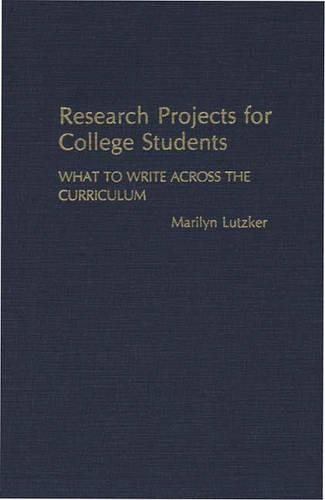
Research Projects for College Students: What to Write Across the Curriculum
(Hardback)
Publishing Details
Research Projects for College Students: What to Write Across the Curriculum
By (Author) Marilyn Lutzker
Bloomsbury Publishing PLC
Greenwood Press
28th July 1988
United States
Classifications
Tertiary Education
Non Fiction
001.42
Physical Properties
Hardback
152
Description
This book helps college instructors in all disciplines design library research projects that students will enjoy writing, and faculty will enjoy reading. It is a librarian's contribution to the literature of the Writing Across the Curriculum movement. The ideas and techniques presented are offered not as prescriptions, but as starting points for the construction of projects to meet the needs and use the resources of a wide range of curricula, students, faculty, and libraries. The book helps instructors desing appropriate undergraduate library research projects with specific practical suggestions for selecting and assigning topics and for fully utilizing available library resources. The author also suggests meaningful ways to teach scholarly documentation, and to design plagiarism-proof assignments. Appendices include tips for grading research papers, sample research worksheets, and a sample selection of topics.
Reviews
Several publications have emerged in recent years in response to the escalating Writing Across the Curriculum' (WAC) movement. Most, such as William L. Rivers and Susan L. Harrington's Finding Facts: Research Writing Across the Curriculum (2nd ed., 1988) and Susan M. Hubbuch's Writing Research Papers Across the Curriculum (2nd ed., 1989) concentrate on research and writing methodology but include chapters about standard library resources. Lutzker's book, however, is concerned only with designing writing assignments that are directly tied to library-based research.' From the librarian's unique perspective, ' Lutzker has compiled a number of suggestions and ideas to counteract the boredom and frustration on the part of both faculty and students' which negate the potential value of research/writing projects.' Admitting that not all of the ideas are practical for all learning objectives, Lutzker submits them as a way of stimulating innovative and more meaningful library assignments. Many of the primary resources described may not be available in all academic libraries, but it is this direction toward the unusual and underused that sets this book apart. Chapters discussing content objectives, writing and research skills, and scholarly documentation are on target, but too brief. Chapter 3, suggesting ways to work with the library staff to best achieve your objectives, ' nicely summarizes every librarian's observation. Recommended for libraries serving undergraduate and graduate faculty seeking ways to enhance their WAC programs.-Choice
This book belongs in instructional resource collections.-American Political Science Review
"This book belongs in instructional resource collections."-American Political Science Review
"Several publications have emerged in recent years in response to the escalating Writing Across the Curriculum' (WAC) movement. Most, such as William L. Rivers and Susan L. Harrington's Finding Facts: Research Writing Across the Curriculum (2nd ed., 1988) and Susan M. Hubbuch's Writing Research Papers Across the Curriculum (2nd ed., 1989) concentrate on research and writing methodology but include chapters about standard library resources. Lutzker's book, however, is concerned only with designing writing assignments that are directly tied to library-based research.' From the librarian's unique perspective, ' Lutzker has compiled a number of suggestions and ideas to counteract the boredom and frustration on the part of both faculty and students' which negate the potential value of research/writing projects.' Admitting that not all of the ideas are practical for all learning objectives, Lutzker submits them as a way of stimulating innovative and more meaningful library assignments. Many of the primary resources described may not be available in all academic libraries, but it is this direction toward the unusual and underused that sets this book apart. Chapters discussing content objectives, writing and research skills, and scholarly documentation are on target, but too brief. Chapter 3, suggesting ways to work with the library staff to best achieve your objectives, ' nicely summarizes every librarian's observation. Recommended for libraries serving undergraduate and graduate faculty seeking ways to enhance their WAC programs."-Choice
Author Bio
MARILYN LUTZKER, Professor in the Library at John Jay College of Criminal Justice, City University of New York.
